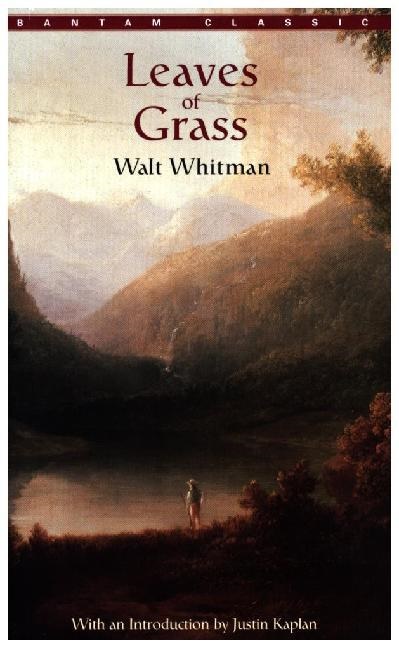Share
Fr. 13.50
Walt Whitman, Walter Whitman
Leaves of Grass
English · Paperback
Shipping usually within 1 to 3 weeks (not available at short notice)
Description
Zusatztext "Whitman's best poems have that permanent quality of being freshly painted! of not being dulled by the varnish of the years." --Malcolm Cowley Informationen zum Autor Before the age of thirty-six there was no sign that Walt Whitman would become even a minor literary figure, let alone the major poetic voice of an emerging America. Born in 1819 on Long Island, he was the second son of a carpenter and contractor. His formal schooling ended at age eleven, when he was apprenticed to a printer in Brooklyn. He became a journeyman printer in 1835 and spent the next two decades as a printer, free-lance writer, and editor in New York. In 1855, at his own expense, he published the twelve long poems, without titles, that make up the first edition of Leaves of Grass. The book, with its unprecedented mixture of the mystical and the earthy, was received with puzzlement or silence, except by America's most distinguished writer, Ralph Waldo Emerson. Whitman lost no time in preparing a second edition, adding "Crossing Brooklyn Ferry" and nineteen other new poems in 1856. With the third edition (1860), the book had tripled in size. Whitman would go on adding to it and revising it for the rest of his life. Whitman's poetry slowly achieved a wide readership in America and in England. He was praised by Swinburne and Tennyson, and visited by Oscar Wilde. He suffered a stroke in 1873 and spent the remainder of his life in Camden, New Jersey. His final edition of Leaves of Grass appeared in 1892, the year of his death. Klappentext One of the great innovative figures in American letters, Walt Whitman created a daringly new kind of poetry that became a major force in world literature. Leaves Of Grass is his one book. First published in 1855 with only twelve poems, it was greeted by Ralph Waldo Emerson as "the wonderful gift . . . the most extraordinary piece of wit and wisdom that America has yet contributed." Over the course of Whitman's life, the book reappeared in many versions, expanded and transformed as the author's experiences and the nation's history changed and grew. Whitman's ambition was to creates something uniquely American. In that he succeeded. His poems have been woven into the very fabric of the American character. From his solemn masterpieces "When Lilacs Last in the Dooryard Bloom'd" and "Out of the Cradle Endlessly Rocking" to the joyous freedom of "Song of Myself," "I Sing the Body Electric," and "Song of the Open Road," Whitman's work lives on, an inspiration to the poets of later generations.INSCRIPTIONS One's-Self I Sing One's-Self I sing, a simple separate person, Yet utter the word Democratic, the word En-Masse. Of physiology from top to toe I sing, Not physiognomy alone nor brain alone is worthy for the Muse, I say the Form complete is worthier far, The Female equally with the Male I sing. Of Life immense in passion, pulse, and power, Cheerful, for freest action form'd under the laws divine, The Modern Man I sing. As I Ponder'd in Silence As I ponder'd in silence, Returning upon my poems, considering, lingering long, A Phantom arose before me with distrustful aspect, Terrible in beauty, age, and power, The genius of poets of old lands, As to me directing like flame its eyes, With finger pointing to many immortal songs, And menacing voice, What singest thou? it said, Know'st thou not there is but one theme for ever-enduring bards? And that is the theme of War, the fortune of battles, The making of perfect soldiers. Be it so, then I answer'd, I too haughty Shade also sing war, and a longer and greater one than any, Waged in my book with varying fortune, with flight, advance and retreat, victory deferr'd and wavering, (Yet methinks certain, or as good a...
List of contents
Editor's Introduction vii
Facsimile Frontispiece 2
Facsimile Title Page 3
Whitman's Introduction 5
Song of Myself 25
A Song for Occupations 87
To Think of Time 98
The Sleepers 105
I Sing the Body Electric 116
Faces 124
Song of the Answerer 129
Europe: The 72d and 73d Years of These States 133
A Boston Ballad 135
There Was a Child Went Forth 138
Who Learns My Lesson Complete 140
Great Are the Myths 142
Report
"Whitman's best poems have that permanent quality of being freshly painted, of not being dulled by the varnish of the years."
--Malcolm Cowley
Product details
| Authors | Walt Whitman, Walter Whitman |
| Publisher | Bantam Books USA |
| Languages | English |
| Product format | Paperback |
| Released | 01.06.1983 |
| EAN | 9780553211160 |
| ISBN | 978-0-553-21116-0 |
| No. of pages | 470 |
| Dimensions | 106 mm x 175 mm x 27 mm |
| Series |
Bantam classic A Bantam Classic A Bantam Classic Bantam Classics Bantam Classic |
| Subjects |
Fiction
> Narrative literature
Humanities, art, music > Linguistics and literary studies |
Customer reviews
No reviews have been written for this item yet. Write the first review and be helpful to other users when they decide on a purchase.
Write a review
Thumbs up or thumbs down? Write your own review.

